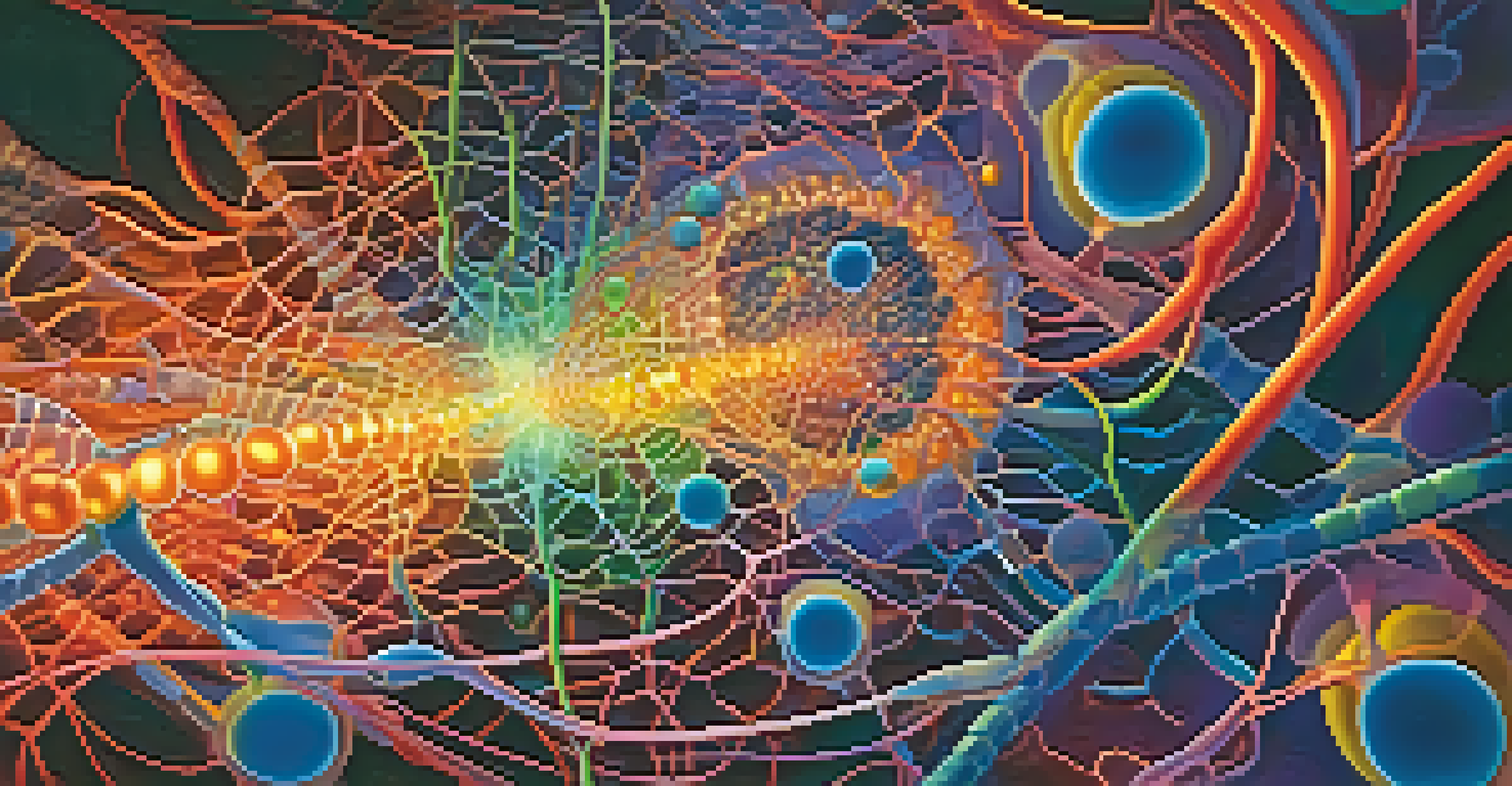The Impact of Proteomics on Disease Understanding

What is Proteomics and Its Importance?
Proteomics is the large-scale study of proteins, which are vital to many biological processes. By analyzing proteins, scientists can gain insights into how they function and interact within the body. This field is essential for understanding the complex nature of diseases at a molecular level, allowing for more targeted approaches to treatment.
Proteomics is the key to understanding the complexity of diseases and unlocking personalized medicine.
Unlike genomics, which focuses on genes, proteomics provides a dynamic view of the biological landscape. Proteins can change in response to various factors like environmental changes, diet, or disease states. Thus, studying them can reveal critical information about disease mechanisms and progression.
As we delve deeper into proteomics, we uncover patterns and anomalies that can indicate the presence of diseases, leading to earlier diagnosis and more personalized treatment plans. This holistic understanding paves the way for innovative therapeutic strategies.
The Role of Proteomics in Cancer Research
Cancer is one of the most complex diseases, characterized by uncontrolled cell growth. Proteomics plays a crucial role in cancer research by helping scientists identify specific proteins that are overexpressed or mutated in tumors. This information can be pivotal in developing targeted therapies that attack cancer cells while sparing healthy ones.

For instance, the identification of biomarkers through proteomic studies can lead to early detection of certain types of cancer. Early intervention often results in better outcomes, making proteomics a valuable tool in the fight against cancer.
Proteomics Enhances Disease Understanding
By studying proteins, researchers can uncover the molecular mechanisms of diseases, leading to better diagnostics and targeted therapies.
Moreover, proteomics can aid in understanding the tumor microenvironment, allowing researchers to explore how cancer cells communicate with each other and their surroundings. This knowledge is vital for developing more effective treatments and improving patient prognosis.
Proteomics in Neurological Disorders
Neurological disorders, such as Alzheimer's and Parkinson's disease, pose significant challenges to researchers and healthcare professionals. Proteomics offers a unique lens through which to study these disorders, helping to identify protein alterations associated with disease onset and progression. By understanding these changes, we can better grasp the underlying mechanisms of these complex conditions.
The future of medicine lies in the ability to tailor treatments based on the unique protein profiles of individuals.
For example, studying the amyloid-beta protein in Alzheimer's disease has provided insights into how its accumulation leads to neurodegeneration. Identifying such protein markers can enhance our understanding of disease pathways and potentially reveal new therapeutic targets.
Additionally, proteomics can help in the development of diagnostic tools that detect these disorders earlier. As we continue to unravel the protein landscapes associated with neurological diseases, we move closer to innovative treatments and improved patient care.
Impact of Proteomics on Drug Development
The journey from drug discovery to market can be long and fraught with challenges. Proteomics streamlines this process by enabling researchers to identify potential drug targets more efficiently. By understanding the protein interactions within disease pathways, scientists can design drugs that specifically target these proteins.
This targeted approach not only increases the likelihood of clinical success but also reduces the risk of side effects, as drugs can be tailored to act on specific biological targets. For instance, proteomic profiling has led to the development of monoclonal antibodies that specifically bind to cancer cells.
Role in Cancer Research
Proteomics helps identify specific proteins in tumors, facilitating early detection and the development of targeted cancer treatments.
Furthermore, proteomics can assist in monitoring the efficacy of new drugs during clinical trials. By analyzing protein expression changes in response to treatment, researchers can gain insights into how well a drug is working and make necessary adjustments to improve outcomes.
Proteomics and Personalized Medicine
Personalized medicine aims to customize healthcare, with decisions tailored to individual patients based on their genetic makeup, lifestyle, and environment. Proteomics plays a vital role in this paradigm by providing detailed information about a person's protein profile. This data can reveal how a patient is likely to respond to specific treatments.
For example, in cancer therapy, understanding the protein expressions in a patient’s tumor can guide oncologists in selecting the most effective treatment plan. This not only enhances efficacy but also minimizes unnecessary side effects from treatments that may not work for certain patients.
Moreover, as we gather more proteomic data, we can refine our understanding of disease susceptibilities in different populations. This knowledge allows for the development of preventative strategies and tailored interventions, ultimately improving patient outcomes.
Challenges and Future Directions in Proteomics
While the advancements in proteomics are promising, there are still several challenges to overcome. One significant hurdle is the complexity of protein interactions, which can vary greatly between individuals and disease states. Understanding these interactions requires sophisticated technologies and analytical methods.
Additionally, the sheer volume of data generated from proteomic studies can be overwhelming. Researchers must develop better tools for data analysis and interpretation to make sense of this information and translate it into clinical applications.
Advancing Personalized Medicine
Proteomics provides insights into individual protein profiles, enabling tailored treatment plans that improve patient outcomes.
Looking ahead, advancements in technology such as mass spectrometry and bioinformatics hold great potential for overcoming these challenges. As we refine our methods, the future of proteomics promises even greater contributions to our understanding of diseases and the development of innovative treatments.
Conclusion: The Transformative Power of Proteomics
In summary, proteomics is revolutionizing our understanding of diseases, offering insights that were previously unattainable. By studying proteins, researchers can uncover the molecular underpinnings of various conditions, leading to better diagnostic tools and targeted therapies. This field not only enhances our knowledge of disease mechanisms but also paves the way for personalized medicine.
As we continue to explore the vast landscape of proteins, we are likely to witness significant breakthroughs in how we approach treatment and prevention. The integration of proteomics into clinical practice represents a vital step toward improving healthcare outcomes for patients around the globe.

Ultimately, the impact of proteomics on disease understanding is profound, and its potential is just beginning to be realized. As technology advances and our knowledge expands, we can look forward to a future where diseases are understood and treated more effectively.